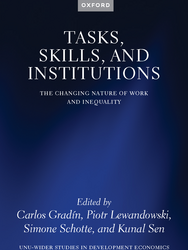Book
Tasks, Skills, and Institutions
The Changing Nature of Work and Inequality
Developed countries have experienced a polarization in earnings and in employment, namely stronger growth in the earnings and jobs for the most and least skilled workers at the expense of those in the middle. This pattern has been attributed to differences in tasks—whether a given job is routine and can be automated or offshored—rather than skills and has reduced employment and incomes in typical middle-class jobs in manufacturing and services. Evidence for developing countries, however, is still scarce and faces bigger challenges, both conceptual and in terms of gathering the necessary data on earnings and task content of jobs.
Tasks, skills, and institutions presents the main results of the UNU-WIDER project, The changing nature of work and inequality, aiming to fill this knowledge gap and deconstruct the common assumption that occupations are identical around the world, which tends to lead to an overestimation of the non-routine task content of jobs in developing and emerging economies. Providing a unique, comparative assessment on how the nature of work is changing in 11 major developing countries, the book explores the role that these changes play in shaping earnings inequality in these societies. Moving past the most conventional explanations of changes in earnings inequality, based on the relative abundance of skilled and unskilled labour, the book explores recent theories that put the nature of tasks performed by workers in their jobs, rather than their skills, at the centre of the analysis.
With contributions from leading scholars in the field, the book provides a nuanced and context-sensitive developing-country perspective with an in-depth assessment of national trends in earnings inequality, as well as the changes in the occupational structure and the remuneration of tasks, while being mindful of broader macroeconomic trends and institutional developments.
 Join the network
Join the network